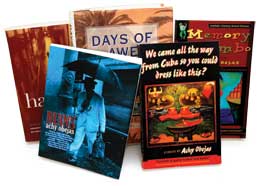
“The Marvelous Reality of Achy Obejas”
By Benjamin Ortiz, for Café Latino Lifestyle Magazine
March 2009
“The world breaks us all, / throws us up against the wall, / splits our hearts with a vengeance… / Pain is the risk and the measure / not just of how far we’re willing to go, / but of how much we’re willing to feel / later, alone in the dark.” Achy Obejas, “The Habits of the Blind”
In poems conjuring afternoons lost in a loverÂ’s embrace, Achy Obejas takes us away from self-deluding flights of fancy and back down to an earth that has its own pungent delights.
Amid lost loves and lives that could have been, Obejas spins verse that has “embraced chaos,” as she puts it in her best-selling poetry chapbook, “This Is What Happened in Our Other Life” (A Midsummer Night’s Press, 2007).
In an interview with Café, back from Cuba and fresh from a holiday trip to Iowa, Achy Obejas warmly opens the door to her Kenwood home and offers deep mugs of bold-roasted coffee over a chat about “Ruins,” her upcoming novel release, on the 50th anniversary of the Cuban revolution.
In a kitchen nook crested with homey placards blazoned in cartoonish bodega advertising — “HOT BOLLOS / CUBAN SANDWICHES / CAFÉ CON LECHE” — Obejas tells a sardonic joke from the Cuban exile community: “Everybody in that first wave of immigrants was like, ‘Oh, I lost my farm, my business.’ My mom loved to tell this joke about how if you put together all the land that everybody lost you would realize that Cuba is really the size of the Soviet Union, because their sense of everything was way hyperbolic.”
“Cubans always have a holy grail,” Obejas continues, “whether itÂ’s the Spanish grandfather who left you millions and you just need to find that birth certificate to get it … or the person whoÂ’s got all this pre-revolutionary money stuffed in their fake ceiling waiting for capitalism to come back. God, they really are the Jews of the Caribbean — thereÂ’s always a Messiah theyÂ’re waiting for that never arrives.”
In the introduction to the anthology “Havana Noir” that she edited for Akashic Books in 2007, Obejas describes the city of her interrupted Cuban childhood as “a city of ironic and often antagonizing contradiction.” Though she takes on subjects so very close to her own skin with brio and sharp wit, Obejas dignifies the sources of her inspiration.
Johnny Temple, Akashic publisher and editor of her forthcoming novel, describes her writing as “gorgeous… stylized without being self-conscious.”
Her new book, in particular, “explores the crisis that Cuba is facing with unusual sensitivity and honesty,” he says. “Too much writing about Cuba is polarized, reflecting either an anti-Communist perspective or an anti-America/imperialist sentiment. Achy deftly avoids these traps in ‘Ruins’ and tells the story with language that is both rich and lucid.”
LAUNCHING PAD
Her journey started when mom and dad left Cuba in 1963, when she was six, taking her to Miami and then ending up in northern Indiana. “It wasn’t a decision that I felt even a little bit comfortable second-guessing,” she says. “I don’t know what I would have done in their position.”
But she started imagining other worlds and selves at the same time she pondered another life that could have been in Cuba. “I started writing very early on, making up my own Greek myths and comic strips when I was about six or so. I’ve always wanted to write — I’ve never wanted to do anything else.”
She moved to Chicago on her own in 1979, having attended various schools, including Indiana University, eventually earning a Masters of Fine Arts from Warren Wilson College. With brief sojourns in Southern California and Hawaii, Obejas made Chicago her home base and launching pad for a career in journalism.
Covering the city for the Sun-Times, then the Windy City Times and later for the Chicago Tribune as a longtime staffer, she admits to having become politicized by communities that were considerably to the left of her Cuban-American upbringing.
When asked about being an activist herself, she responds with knit eyebrows and a slightly annoyed smile. “You know, I’m always amused by this notion of activism. I don’t really think of myself very much that way,” she says. “But when I got here, in the late 70s and early 80s, the activist community was the Puerto Rican community. [It] was in absolute revolt over a lot of things that had been going on, and [they] were working for inclusion in a way that paved the way for a lot of what happened later with Harold Washington and the election of other people of color.”
Her journalism led to Peter Lisagor and Studs Terkel awards, plus a team Pulitzer at the Tribune. Obejas reflects specifically on the short-lived Sun-Times Spanish-language column “Los Vecinos,” which she shared with Jorge Casuso and Bill Zayas, as an important corrective to Chicago journalism. “We wrote a lot of stories about political engagement that the American reporters couldn’t get into,” she says. “Part of it was language, part of it was culture, part of it was fear. They were scared of going south of Madison, but they were terrified of going west of Western for black and Latino issues.”
Former colleague and current Tribune reporter Monica Eng confirms in an e-mail how Obejas pushed coverage toward a more inclusive Chicago: “Achy was a real anomaly at this largely white and largely male paper. And she went a looooong way to reel in stories that the typical Tribune staffer would never know about and from worlds they simply did not inhabit, but that Achy did.”
The gay community was one of the worlds she inhabited and helped promote beyond the bounds of objective journalism. “[T]hat’s about the only time that I actually have ever really been engaged in activist things,” she points out.
“I worked for Windy City Times, which was an activist newspaper,” she says. “I was with the Mayor’s commission on lesbian and gay issues for a little while, and I also participated in the passage of the Human Rights Ordinance. I actually wrote the speech that [Mayor] Eugene Sawyer gave on the passage of the ordinance [in 1988].”
RETURN FROM EXILE
Events and characters in Chicago fed her literary imagination as she wrote, submitted and published short works that were compiled in 1994 by San Francisco’s Cleis Press in her first book, “We Came All the Way From Cuba So You Could Dress Like This?” Cleis followed the short story collection with Obejas’ first novel, “Memory Mambo” (1996), focused on one Cuban family’s urban exile in Chicago.
Between her first two published works, Obejas embarked on a return from exile that continues to this day. “I wanted very much to reconnect, and the first time I got an invitation was in the early 80s,” she remembers. “But I needed my Cuban passport, which my parents had, and my mom and dad refused. All my Cuban friends were going, but I was sort of living vicariously through them.”
Eventually, mom and dad got used to the idea, so Obejas was able to reconnect and establish her current network of friends, relatives and neighbors back in Cuba.
From these trips in the late 90s, Obejas would gather material for her 2001 novel, “Days of Awe,” winner of the Lambda Award for Lesbian Fiction.
The novel shifts phantasmagorically between memory, dream, history and narrative, as the main character, like Obejas, discovers a hidden Jewish heritage.
For Obejas, this was nothing shocking: “[My family had] always lived in Jewish communities and had frequently celebrated Jewish holidays. But I’m neither a normative nor a crypto-Jew. I love the social justice aspects of Judaism, the sense of justice, the emphasis on literacy and the idea of connectiveness, but I pray my own way.”
“Days of Awe” seemed also a work of translation and anthologizing — of cultures, languages, faiths, revolutionary rhetoric and reclaimed Caribbean authors. Obejas continues this strategy in “Ruins,” a recasting of Ernest Hemingway’s “Old Man and the Sea” in the midst of the Special Period in Cuba.
The main character, “Usnavy” — a reference to American military power branding Cubans — struggles to keep his family together while remaining true to the revolution. But post-Soviet scarcity ultimately prods him to engage in “bisnes,” the underground economy.
Obejas dedicates the book to the neighborhood she’s cultivated since 1997 in Old Havana. “I think [Usnavy] is a dreamer,” she says. “Like most people who believed in the revolution — they were dreamers. They really wanted to find that rainbow at the end, after the storm.”
Obejas points out that this book is not about exile: It’s about those currently in Cuba “who really believed in the revolutionary experiment, and who really gave it their all … because of the greater good, and then the greater good never came.”
Contrasting Usnavy’s quixotic fantasies, Obejas is nothing but realistic about the coming, eventual re-alignment of Cuba: “I live in Chicago, with an ever-diminishing Cuban-American community and far from the Miami epicenter. I am much more interested in being a part of a post-revolutionary Cuba than the diasporic community, which will most likely follow historical pattern and be absorbed into the U.S. mainstream as another immigrant (no longer exile) community.”
Obejas is in a good place to study these changes as DePaul University’s Sor Juana Inés de la Cruz chair in Latin American and Latino Studies.
Currently, sheÂ’s busy translating into English the poetry of classic Cuban poet Nicolás Guillén. She also delivered a translation in fall 2008 of Junot DÃazÂ’s Pulitzer-winning “The Brief Wondrous Life of Oscar Wao.”
In an effusive outburst of e-mail, DÃaz describes Obejas as an “aching, scathing artist of the first order, and her vision of an America haunted forever by Cuba and a Cuba forever haunted by itself is fundamental to remembering that there is no American century without a voyage to Cuba, none that is worth a damn.”

« Journalism Guest Speaker Series (SPRING 2009) Spanish Karaoke (Café Magazine) »


